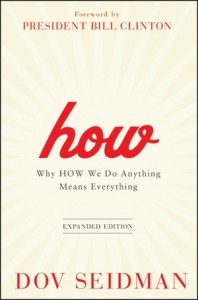Faith
We crested the hill and there it was: a square little brick two-story that had been improved just a little, with a welcoming windowed front and a high, aerie-like upstairs. It was the cheapest house we’d seen, and because it was 2005 and things were crazy, we spent about twenty minutes deliberating and put in a contract with a modest escalation. When we found out later that the house was ours, we found out we'd beaten out another family. The house had been listed barely a day.
As we found out later, we’d put in the contract on the feast day of Saint Xenia of Petersburg, a nineteenth-century Russian “fool-for-Christ” who'd mourned her army colonel husband’s death by donning his uniform and living as a pauper in the city's streets, performing unasked acts of generous service.
It is said that at night she hauled bricks to hasten completion of a church’s construction, and on the internet you can find a copy of this wonderful icon, St. Xenia hoisting herself on a brick construction wall with her long grey hair swinging. One of the things for which St. Xenia is said to intercede is to help people in finding housing.
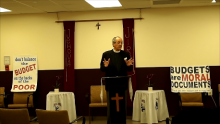
“The problems of homelessness and poverty are not self-inflicted, they are the result of priorities of our society and those priorities are not centered on people but on gathering more wealth for a small number of people. Many of us [homeless people] – despite the stereotypes – drew deeply on our faith and the fact that we’re all children of God and organized ourselves. We’re homeless, not helpless. That’s why our call is to work with us and not for us.”
— Willie Baptist, Scholar-in-Residence The Poverty Initiative at Union Theological Seminary
It’s time to invite the Occupy Movement to church!
And Thanksgiving is the perfect occasion. Have some of the young protesters — the “99ers” as they’re becoming known — from this rapidly growing movement over for a big holiday dinner!
Our faith communities and organizations should swing their doors wide and greet the Occupiers with open arms, offering them a feast to say “thank you” for having the courage to raise the very religious and biblical issue of growing inequality in our society.

This is true of any bad news, really. When I feel sick. When I don’t get my way. When I’ve had a bad day. You name it. If it’s negative, then I look forward to sharing it. I don’t mean to; I just do.
I sense this is normal, but it doesn’t make it right.

Arizona won a significant victory last week when Russell Pearce, author of Senate Bill 1070, lost in a first-ever recall election.
It was not without great effort. I’ve since been reflecting on the lessons of the work and how we traveled from the darkness of SB1070 to the hope we feel today.
The Rev. Martin Luther King Jr. and Archbishop Oscar Romero are our heroes. They shared much in common: Both ultimately were focused on being obedient to God and his call on their lives and as such they were both, first, ministers of the Gospel. King and Romero were fixated on justice — in love with poor people and hurting communities. Both searched for middle ground while others stayed safe inside comfortable margins; both were agents of reconciliation.
And, finally, both were martyred for their message.
Yet Romero and King have a seeming discrepancy I want to explore.
Romero called us to take the long view; King discussed the fierce urgency of now.
Romero essentially prays: Trust God, be faithful. King preaches: now is the time, act forcefully.
One year of prison costs more than one year at Princeton. Capitalism and social justice. OpEd: The values discussion we're not having. 'One Day's Wages' fights poverty two years on. Government aid helped cut U.S. poverty nearly in half. Religion-friendly democracy and democracy-friendly religion. And Newt Gingrich says God forgave him.
Social justice index: USA No. 27 of 31. Democrats in Congress attempt to eat on $4.50 a day to protest potential budget cuts. Republicans shift focus from jobs to God. OpEd: Obama, the G20 and the 99 percent. In Congress, the rich get richer. The Shadow Superpower. And the U.S. sues South Carolina over immigration law.
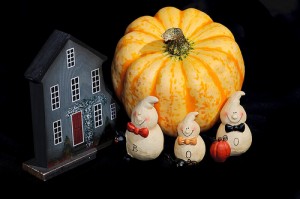
Is Halloween a prime time for evangelism?
Are religious tracks passed out along with (or in lieu of) "treats" really the best way to spread the gospel message?
Or do the roots and practices of Halloween run so deeply counter to Christian tradition that Halloween is best ignored by believers?
At times such as these, the church often finds itself wrestling with the big question H. Richard Niebuhr posed in his seminal 1951 work, Christ and Culture. That is, to what extent should Christians engage in and interact with the world around them?
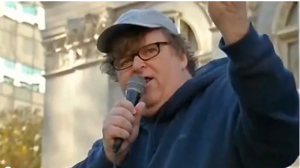
Filmmaker Michael Moore told anti-Wall Street protesters in Oakland that the Occupy movement -- which has spread to cities across America and overseas -- in inspiring millions who are angry about corporate excess, income inequality and the failure of politicians to address issues facing the majority of Americans.
"We've killed despair across the country and we've killed apathy," he said.
Watch the video of Moore's speech inside...
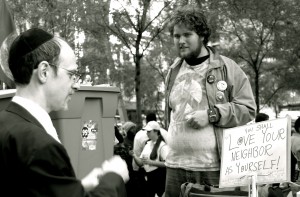 We're in this thing together or we're not in this thing at all.
We're in this thing together or we're not in this thing at all.
We should all be marching in the streets.
We are the 100 percent.
We are poor. We are well-to-do. We are those somewhere in the middle. We are aware of the struggles and unfairness of this world and for this reason we are sensitive to one another's needs. So, we love our neighbors as ourselves.
What was most telling about the disagreement between the two men was their discussion of Luke 4. Mohler argued the passage should be understood in light of how he interpreted the preaching and teaching of Paul and the other apostles. This means that when Jesus said that he came to bring good news to the poor that good news was personal salvation.
Wallis argued that yes, personal salvation is one part of that good news, but that the other part is the Kingdom of God breaking into the world and transforming societal relationships as well. When the Gospel is proclaimed, it is good news for a poor person's entire being, community and world -- not just his or her soul.
First, it was encouraging to hear Mohler spend a lot of time emphasizing that working for justice is essential to fulfillment of the Great Commission. Throughout the night he repeated his concern that a lot of Churches are REALLY bad at making disciples who actually do the things Jesus told us to do. As the president of one of the largest seminaries in the world, it will be interesting to see if he is able to train a generation of pastors who will do things differently. My concern is that he is missing the connection between his theology and the failure of Christians to actually do justice.
"Where my feminists at?" on #OccupyWallStreet. Test your global hunger knowledge. Race and OWS. Poverty in your backyard. How to be a "1 Percenter." OWS to march on banks. Romney embraces climate change denial. Magicians say their craft makes them see faith as little more than "hocus-pocus." Catholic University sued by Muslim students. And faith, political leaders find out how far food stamps actually go.
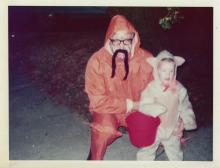
One of my most vivid childhood memories of Halloween 1977, the year my family moved to a new town in Connecticut right after the school year had begun. I don't recall what my costume was, but I do remember going door-to-door with my father, meeting new neighbors and collecting a heavy bag of candy, as the suburban warren of Cape Cods and manicured lawns morphed into an other-worldly fairyland.
I was 7 years old and the new kid on the block, so when the cover of darkness fell at sunset, I hadn't a clue where I was. As my father deftly navigated our way home in the crisp autumn night, it felt like he had performed a magic trick. When the morning came, I couldn't believe that our adventure the night before had been on these same streets. To my young imagination (and heart) it felt as if we had been walking through Narnia or Rivendell rather than a sleepy New England suburb.
A few years after that, my family stopped celebrating Halloween. We had become born-again Christians and our Southern Baptist church frowned on the practice. Halloween, I was taught, was an occult holiday (or maybe even Satanic!) and good Christians should have nothing to do with it.
FoxNews shuns pro-immigrant voices. How do we repair souls returning from the war? Does Christianity translate into public policy? Lobbyists role in 2012 fundraising. Oakland mayor promises "minimal police presence" at OWS protests. Cain says he doesn't need to know foreign policy details. And only 40 percent of Americans correctly identify Romney as Mormon.
Baby steppin': Economy grew 2.5 percent in the third quarter. Democrats first offer: $3 trillion for debt. Immigration is a faith issue. Harsh rhetoric to derail the GOP? The canon of St. Paul's Cathedral in London resigns over plans to evict Occupy London protesters. Elizabeth Warren and the #OccupyWallStreet election test.
Finally, as President Obama has announced, this American war will soon be over, with most of the 44,000 American troops still in Iraq coming home in time to be with their families for Christmas.
The initial feelings that rushed over me after hearing the White House announcement were of deep relief. But then they turned to deep sadness over the terrible cost of a war that was, from the beginning, wrong; intellectually, politically, strategically and, above all, morally wrong.
The War in Iraq was fundamentally a war of choice, and it was the wrong choice.
The reason the word Evangelical has become so poisonous is because the answer to the above question comes from a conversion-based model of cultural engagement - political, theological and social. Too many Christians believe, and have wrongly been taught, that those "others" and "opposites" who have made an active choice not to believe in "our" teachings are justifiably: 1) left to their own devices as we wash our hands of them because of their bad choice (think in terms of blood-on-their-own-head); or 2) uninformed, so much so that their "no" is an illegitimate answer.
Evangelicals care more about positions -- whether progressive or conservative -- than people. We lack nuance. We have become either all Scripture or all Justice. I don't know where the balance was lost in terms of holding Scripture in high authority and, simultaneously, loving with reckless abandon?
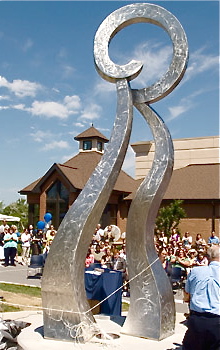
Our moral strength as a society comes from how we treat vulnerable populations. The rise of programs such as Medicaid and Head Start has allowed the independent living movement among those with disabilities to flourish and groups such as Heritage Christian Services do their life-changing work
But here's the problem: Heritage Christian Services just saw their funding cut by the federal government and they are concerned that worst of the cuts are yet to come.

